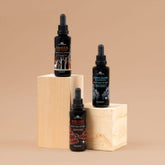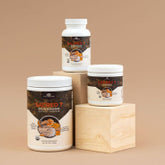
Benefits of Reishi Mushroom - Emerging Reishi Research
Reishi (ganoderma lucidum)

Reishi (or Lingzhi) mushroom is one of the oldest known health foods, with its use dating back to 300 B.C. in China. Reishi is a true panacea, with hundreds of bioactive compounds identified in scientific literature. Research suggests it can do everything from fighting cancer to improving sleep. Since touting every possible benefit of Reishi is beyond the scope of this article, we want to instead highlight just a few new pieces of research.
A 2017 study found evidence that Reishi suppresses breast cancer cell growth. It found that Reishi suppressed a certain signaling pathway called Wnt/β-catenin which is responsible for many types of cancer, including breast cancer. The study ultimately indicated that supplemental Reishi could be a potent inhibitor of breast cancer (1).
Another new study looked at immunoglobulin A (IgA) secretion in rats after they had taken Reishi powder. IgA helps mediate a number of the body’s protective functions, and is an important antibody that acts as the immune system’s first line of defense. It is secreted in large part by mucous membranes in different parts of the digestive track. The digestive system is often the first point of contact for pathogens, and its reaction often dictates whether or not the body gets overtaken and becomes sick from the pathogens. The study found that Reishi increased IgA secretion in the small intestines of the rats. Overall it concluded that Reishi might reduce the risk of intestinal infection (2).
Yet another study found that Reishi polysaccharides may have neuroprotective effects. It found that the polysaccharides down-regulated pro-inflammatory cytokines and promoted anti-inflammatory expressions in microglia (an important type of cell that’s prevalent in the brain and spinal cord). Many neurodegenerative diseases are caused in part by inflammation. This study is exciting because it suggests that Reishi may have some ability to protect the nervous system by decreasing inflammation (3).
Inspiring research continues to be published about the therapeutic potential of Reishi. There are many recurring trends in the research about its anti-cancer, immunomodulating, and neuroprotective properties. Reishi is historically regarded highly as a superfood and a medicine for good reason. Hopefully more research about the mushroom continues to make its way into the mainstream so that more people can benefit from all it has to offer.
1. Zhang, Yu. "Ganoderma lucidum (Reishi) suppresses proliferation and migration of breast cancer cells via inhibiting Wnt/β-catenin signaling". Biochemical and Biophysical Research Communications
Volume 488, Issue 4, 8 July 2017, Pages 679-684.
2. Kubota, Atsuhito, et al. Reishi mushroom Ganoderma lucidum Modulates IgA production and alpha-defensin expression in the rat small intestine. Journal of Ethnopharmacology, Volume 214, 25 March 2018, Pages 240-243.
3. Cai Q, Li Y, Pei G. Polysaccharides from Ganoderma lucidum attenuate microglia-mediated neuroinflammation and modulate microglial phagocytosis and behavioural response. J Neuroinflammation. 2017;14(1):63. Published 2017 Mar 24. doi:10.1186/s12974-017-0839-0


